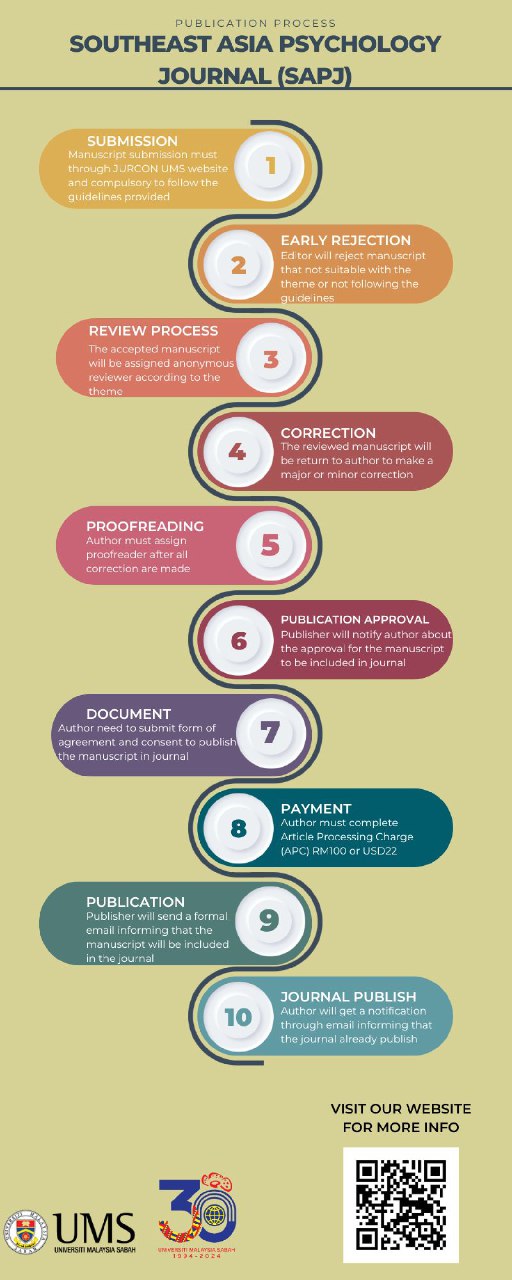Factors predicting recycling behaviour among Malaysian
DOI:
https://doi.org/10.51200/sapj.v1i1.5729Keywords:
recycling behaviour, recycling attitude, values towards the environmentAbstract
Malaysia is facing a crisis in solid waste management due to rapid urbanization and high concentration of population. Sadly, public participation in recycling is still very low despite rigorous campaigns conducted by the government. Only a small amount of solid waste generated in Malaysia is recycled – far below the rate of 15 to 40 percent in developed countries. This study examines the recycling behaviour among urban households within the Klang Valley area. Specifically, the purpose of the study is to determine factors that increase the probability of recycling behaviour among households. Data analysis technique used consisted of bivariate analysis and logistic regression. The results of logistics regression testing for socio-demographic and psychological characteristics show partial significance at a probability level of .050. The result of Hosmer and Lamershow Goodness-of-fit shows total significance at .050. The
logistic model that utilizes study data drawn from the 342 samples and the results of the Binomial Logistic Regression indicate that recycling increased among respondents who are married, possess higher education levels have positive values towards the environment and positive attitudes towards recycling. Interestingly, gender, different types of employment status, types of accommodation, house ownership, and knowledge of recycling were not reliable predictors of recycling behaviour. The findings of the study could be used for designing recycling schemes although it is clear that a one-size-fits-all approach is not acceptable.
References
Agamuthu, P. (2001). Solid Waste: Principles and Management. Institute of Biological Science, University of Malaya.
Arkkelin, D., Schroeder J., Suchodoski K., Skrenes J., & Rodriquez, M. (2000). Psychological Studies on Recycling. Paper presented to Annual meeting of the Midwestern Psychological Association, Chicago, Illinois. commitment.html Retrieved from: http://www.valpo.edu/services/recycling/recycling
Barr, S., Gilg, A. W., and Ford, N.J. (2001).Differences between household waste reduction, reuse & recycling behaviour: a study of reported behaviours, intentions and explanatory variables. Journal of Environmental and Waste Management, 4(2), 69-82.
Bratt, C. (1999). The impact of norms and assumed consequences on recycling behaviours. Journal of Environmental Behaviour, 31(5), 630-656.
Christer, B. (2006). The assessment of household’s recycling costs: The role of personal motives. Journal of Ecological Economics, 56, 560-569.
Clarke, M.J. (1999). Introduction to waste prevention and recycling. Retrieved from http://www.geo.hunter.cuny.edu/~mclarke/Introductiontowastepreventionandrecycling.htm
De Young, R. (1986). Some psychological aspects of recycling. Journal of Environment and Behaviour, 18, 435 – 449.
Dunlap, R. E., Van Liere, K. D., Mertig, A. G. and Jones, R. E. (2000), New Trends in Measuring Environmental Attitudes: Measuring Endorsement of the New Ecological Paradigm: A Revised NEP Scale. Journal of Social Issues, 56: 425–442. doi: 10.1111/0022-4537.00176
Eighth Malaysian Plan (2001-2005). Economic Planning Unit, Prime Minister’s Department, Malaysia.
Elizabeth, J. & K.T. Chelvi. Cover story: Recycling makes slow progress. The Star News, October 20, 2003.
Hansmann, R., Bernasconi, P., Smieszek, T., Loukopoulos, P. & Scholz, R.W. (2006). Justifications and selforganization as determinants of recycling behaviour: The case of used batteries. Journal of Resources, Conservation & Recycling 47, 133-159.
Hopper, J., & Nielsen, J.M. (1991). Recycling as altruistic behaviour: Normative and behavioural strategies to expand participation in a community recycling program. Journal of Environment and Behaviour, 23(2), 195 - 220.








